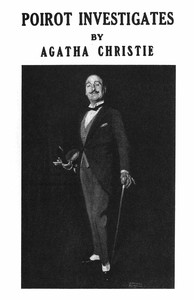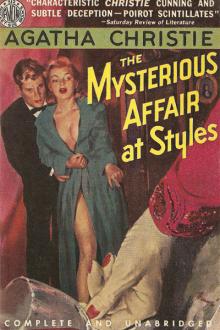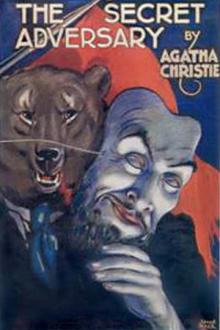Poirot Investigates by Agatha Christie (10 ebook reader .TXT) 📗

- Author: Agatha Christie
Book online «Poirot Investigates by Agatha Christie (10 ebook reader .TXT) 📗». Author Agatha Christie
“Pretty—very pretty—altogether a charming little problem,” murmured Poirot. “Proceed, my good friend.”
“About a quarter of an hour later a tall, dark man with a thick black moustache rang the front-door bell, and explained that he had an appointment with Mr. Davenheim. He gave the name of Lowen, and in accordance with the banker’s instructions was shown into the study. Nearly an hour passed. Mr. Davenheim did not return. Finally Mr. Lowen rang the bell, and explained that he was unable to wait any longer, as he must catch his train back to town. Mrs. Davenheim apologized for her husband’s absence, which seemed unaccountable, as she knew him to have been expecting the visitor. Mr. Lowen reiterated his regrets and took his departure.
“Well, as every one knows, Mr. Davenheim did not return. Early on Sunday morning the police were communicated with, but could make neither head nor tail of the matter. Mr. Davenheim seemed literally to have vanished into thin air. He had not been to the post office; nor had he been seen passing through the village. At the station they were positive he had not departed by any train. His own motor had not left the garage. If he had hired a car to meet him in some lonely spot, it seems almost certain that by this time, in view of the large reward offered for information, the driver of it would have come forward to tell what he knew. True, there was a small race-meeting at Entfield, five miles away, and if he had walked to that station he might have passed unnoticed in the crowd. But since then his photograph and a full description of him have been circulated in every newspaper, and nobody has been able to give any news of him. We have, of course, received many letters from all over England, but each clue, so far, has ended in disappointment.
“On Monday morning a further sensational discovery came to light. Behind a portière in Mr. Davenheim’s study stands a safe, and that safe had been broken into and rifled. The windows were fastened securely on the inside, which seems to put an ordinary burglary out of court, unless, of course, an accomplice within the house fastened them again afterwards. On the other hand, Sunday having intervened, and the household being in a state of chaos, it is likely that the burglary was committed on the Saturday, and remained undetected until Monday.”
“Précisément,” said Poirot dryly. “Well, is he arrested, ce pauvre M. Lowen?”
Japp grinned. “Not yet. But he’s under pretty close supervision.”
Poirot nodded. “What was taken from the safe? Have you any idea?”
“We’ve been going into that with the junior partner of the firm and Mrs. Davenheim. Apparently there was a considerable amount in bearer bonds, and a very large sum in notes, owing to some large transaction having been just carried through. There was also a small fortune in jewellery. All Mrs. Davenheim’s jewels were kept in the safe. The purchasing of them had become a passion with her husband of late years, and hardly a month passed that he did not make her a present of some rare and costly gem.”
“Altogether a good haul,” said Poirot thoughtfully. “Now, what about Lowen? Is it known what his business was with Davenheim that evening?”
“Well, the two men were apparently not on very good terms. Lowen is a speculator in quite a small way. Nevertheless, he has been able once or twice to score a coup off Davenheim in the market, though it seems they seldom or never actually met. It was a matter concerning some South American shares which led the banker to make his appointment.”
“Had Davenheim interests in South America, then?”
“I believe so. Mrs. Davenheim happened to mention that he spent all last autumn in Buenos Ayres.”
“Any trouble in his home life? Were the husband and wife on good terms?”
“I should say his domestic life was quite peaceful and uneventful. Mrs. Davenheim is a pleasant, rather unintelligent woman. Quite a nonentity, I think.”
“Then we must not look for the solution of the mystery there. Had he any enemies?”
“He had plenty of financial rivals, and no doubt there are many people whom he has got the better of who bear him no particular good-will. But there was no one likely to make away with him—and, if they had, where is the body?”
“Exactly. As Hastings says, bodies have a habit of coming to light with fatal persistency.”
“By the way, one of the gardeners says he saw a figure going round to the side of the house toward the rose-garden. The long French window of the study opens on to the rose-garden, and Mr. Davenheim frequently entered and left the house that way. But the man was a good way off, at work on some cucumber frames, and cannot even say whether it was the figure of his master or not. Also, he cannot fix the time with any accuracy. It must have been before six, as the gardeners cease work at that time.”
“And Mr. Davenheim left the house?”
“About half-past five or thereabouts.”
“What lies beyond the rose-garden?”
“A lake.”
“With a boathouse?”
“Yes, a couple of punts are kept there. I suppose you’re thinking of suicide, Monsieur Poirot? Well, I don’t mind telling you that Miller’s going down to-morrow expressly to see that piece of water dragged. That’s the kind of man he is!”
Poirot smiled faintly, and turned to me. “Hastings, I pray you, hand me that copy of the Daily Megaphone. If I remember rightly, there is an unusually clear photograph there of the missing man.”
I rose, and found the sheet required. Poirot studied the features attentively.
“H’m!” he murmured. “Wears his hair rather long and wavy, full moustache and pointed beard, bushy eyebrows. Eyes dark?”
“Yes.”
“Hair and beard turning grey?”
The detective nodded. “Well, Monsieur Poirot, what have you got to say to it all? Clear as daylight, eh?”
“On the contrary, most obscure.”
The Scotland Yard man looked pleased.
“Which gives me great hopes of solving it,” finished Poirot placidly.
“Eh?”
“I find it a good sign when a case is obscure. If a thing is clear as daylight—eh bien, mistrust it! Some one has made it so.”
Japp shook his head almost pityingly. “Well, each to their fancy. But it’s not a bad thing to see your way clear ahead.”
“I do not see,” murmured Poirot. “I shut my eyes—and think.”
Japp sighed. “Well, you’ve got a clear week to think in.”
“And you will bring me any fresh developments that arise—the result of the labours of the hard-working and lynx-eyed Inspector Miller, for instance?”
“Certainly. That’s in the bargain.”
“Seems a shame, doesn’t it?” said Japp to me as I accompanied him to the door. “Like robbing a child!”
I could not help agreeing with a smile. I was still smiling as I re-entered the room.
“Eh bien!” said Poirot immediately. “You make fun of Papa Poirot, is it not so?” He shook his finger at me. “You do not trust his grey cells? Ah, do not be confused! Let us discuss this little problem—incomplete as yet, I admit, but already showing one or two points of interest.”
“The lake!” I said significantly.
“And even more than the lake, the boathouse!”
I looked sidewise at Poirot. He was smiling in his most inscrutable fashion. I felt that, for the moment, it would be quite useless to question him further.
We heard nothing of Japp until the following evening, when he walked in about nine o’clock. I saw at once by his expression that he was bursting with news of some kind.
“Eh bien, my friend,” remarked Poirot. “All goes well? But do not tell me that you have discovered the body of Mr. Davenheim in your lake, because I shall not believe you.”
“We haven’t found the body, but we did find his clothes—the identical clothes he was wearing that day. What do you say to that?”
“Any other clothes missing from the house?”
“No, his valet is quite positive on that point. The rest of his wardrobe is intact. There’s more. We’ve arrested Lowen. One of the maids, whose business it is to fasten the bedroom windows, declares that she saw Lowen coming towards the study through the rose-garden about a quarter past six. That would be about ten minutes before he left the house.”
“What does he himself say to that?”
“Denied first of all that he had ever left the study. But the maid was positive, and he pretended afterwards that he had forgotten just stepping out of the window to examine an unusual species of rose. Rather a weak story! And there’s fresh evidence against him come to light. Mr. Davenheim always wore a thick gold ring set with a solitaire diamond on the little finger of his right hand. Well, that ring was pawned in London on Saturday night by a man called Billy Kellett! He’s already known to the police—did three months last autumn for lifting an old gentleman’s watch. It seems he tried to pawn the ring at no less than five different places, succeeded at the last one, got gloriously drunk on the proceeds, assaulted a policeman, and was run in in consequence. I went to Bow Street with Miller and saw him. He’s sober enough now, and I don’t mind admitting we pretty well frightened the life out of him, hinting he might be charged with murder. This is his yarn, and a very queer one it is.
“He was at Entfield races on Saturday, though I dare say scarfpins was his line of business, rather than betting. Anyway, he had a bad day, and was down on his luck. He was tramping along the road to Chingside, and sat down in a ditch to rest just before he got into the village. A few minutes later he noticed a man coming along the road to the village, ‘dark-complexioned gent, with a big moustache, one of them city toffs,’ is his description of the man.
“Kellett was half concealed from the road by a heap of stones. Just before he got abreast of him, the man looked quickly up and down the road, and seeing it apparently deserted he took a small object from his pocket and threw it over the hedge. Then he went on towards the station. Now, the object he had thrown over the hedge had fallen with a slight ‘chink’ which aroused the curiosity of the human derelict in the ditch. He investigated and, after a short search, discovered the ring! That is Kellett’s story. It’s only fair to say that Lowen denies it utterly, and of course the word of a man like Kellett can’t be relied upon in the slightest. It’s within the bounds of possibility that he met Davenheim in the lane and robbed and murdered him.”
Poirot shook his head.
“Very improbable, mon ami. He had no means of disposing of the body. It would have been found by now. Secondly, the open way in which he pawned the ring makes it unlikely that he did murder to get it. Thirdly, your sneak-thief is rarely a murderer. Fourthly, as he has been in prison since Saturday, it would be too much of a coincidence that he is able to give so accurate a description of Lowen.”
Japp nodded. “I don’t say you’re not right. But all the same, you won’t get a jury to take much note of a jailbird’s evidence. What seems odd to me is that Lowen couldn’t find a cleverer way of disposing of the ring.”
Poirot shrugged his shoulders. “Well, after all, if it were found in the neighbourhood, it might be argued that Davenheim himself had dropped it.”
“But why remove it from the body at all?” I cried.
“There might be a reason for that,” said Japp. “Do you know that just beyond the lake, a little gate leads out on to the hill, and not three minutes’ walk brings you to—what do you think?—a lime kiln.”
“Good heavens!” I cried. “You mean that the lime which destroyed the body would be powerless to affect the metal of the ring?”
“Exactly.”
“It seems to me,” I said, “that that explains everything. What a horrible crime!”
By common consent we both turned and looked at Poirot. He seemed lost in reflection, his brow knitted, as though with some supreme mental effort. I felt that at last his keen intellect was asserting itself. What would his first words be? We were not long left in doubt. With a sigh, the tension of his attitude relaxed, and turning to Japp, he asked:
“Have you any idea, my friend, whether Mr. and Mrs. Davenheim occupied the same bedroom?”
The question seemed so ludicrously inappropriate that for a moment we both stared in silence. Then Japp burst into a laugh. “Good Lord, Monsieur Poirot, I thought you were coming out with something startling. As to your question, I’m sure I don’t know.”
“You could find out?” asked Poirot with curious persistence.
“Oh, certainly—if you really want to know.”
“Merci, mon ami. I should be obliged if you would make a point of it.”
Japp stared at him a few minutes longer, but Poirot seemed to have forgotten us both. The detective shook his head sadly at me, and murmuring, “Poor old fellow! War’s been too much for him!” gently withdrew from





Comments (0)